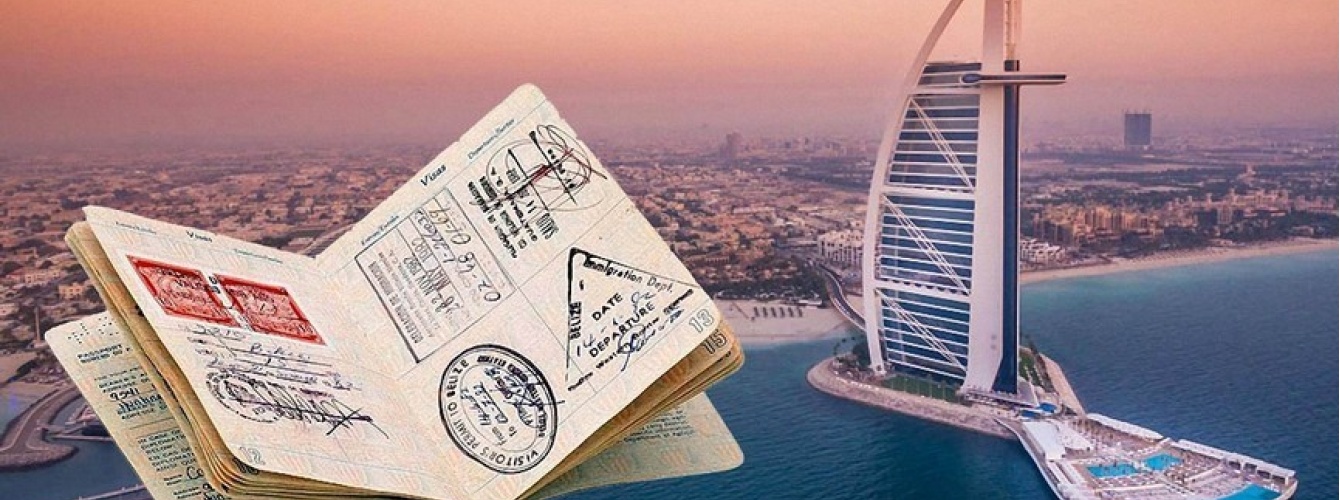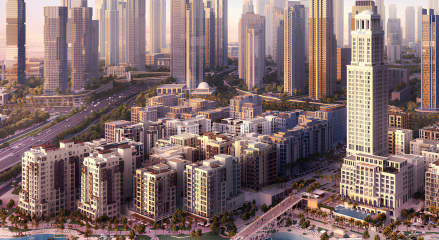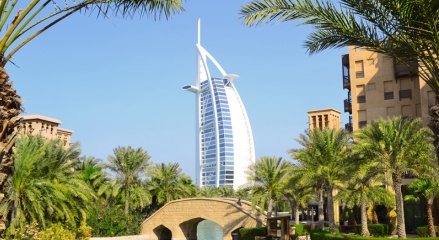UAE Residence Visa

A residency visa in the UAE is a document that allows foreign nationals to legally live and work in the United Arab Emirates for an extended period. The visa is issued for a period ranging from 2 to 3 years, and sometimes even for 10 years, and can be renewed an unlimited number of times, depending on the need. This document gives foreign nationals the opportunity to become long-term residents of Dubai. It allows them to enjoy freedom of movement, access to high-quality healthcare and education services, and provides the opportunity to develop their business in an attractive and promising environment.
Types of Residency Visas in the UAE
There are several types of visas in the UAE designed for various purposes of visiting the country:
Tourist Visa:
Ideal for those planning to visit the country for leisure, sightseeing, and getting acquainted with local attractions. The basic validity period is 30 days, with the option to choose single or multiple entries.
Visitor Visa:
Intended for those planning to visit their relatives living in the UAE. It is based on an invitation from a resident of the Emirates and is granted for up to 30 days with the option to extend. The visa extension application must be submitted by the sponsor. Sponsors can be:
- UAE residents with residency;
- Organizations officially registered in the Emirates;
- Hotels with a license that have the right to sponsor visas.
Work Visa:
Granted to foreigners for 2 years, seeking to enter the UAE for employment. Work is allowed exclusively in the organization that initiated the invitation. If a foreign national decides to find a job in the UAE while on another type of visa, they must first cancel the current visa and then apply for a work visa. The employer pays for this visa.
Student Visa:
This type of residency in the UAE is available to students over 18 years old for 1 year with the possibility of annual renewal until the end of their studies. Enrollment confirmation from an accredited university or college is required. The visa application can be submitted by the student, their parents, or the educational institution as a sponsor. With high academic achievements, the visa is extended for 5 years at once. This visa is granted to:
- School graduates who have completed state or private secondary educational institutions with a grade of no less than 95%.
- University students with an average grade point of at least 3.75.
Investor/Entrepreneur Visa:
Available to individuals ready to invest their funds in the UAE economy. Granted for 2, 5, or 10 years and allows obtaining residency status, opening bank accounts, using medical services, and earning income from assets in the Emirates.
Investment options include:
- Investments in UAE funds.
- Establishing a company in the Emirates with a minimum share capital of 10 million dirhams.
- Entering a company with a share amount of at least 10 million dirhams.
- Purchasing real estate worth from 750 thousand dirhams.
The visa validity depends on the size of the investments. To obtain a Golden Visa for 10 years, one needs to invest at least 10 million dirhams in an investment fund or a company, with these funds not being borrowed and at least 60% of the total investment not being in real estate.
The investor visa also allows applying for visas for close relatives and dependents of the applicant, with the resident acting as a sponsor. To extend the visa, the resident must meet the criteria of the investment program.
Remote Work Visa:
This type of visa is intended for foreign nationals wishing to engage in freelance activities in the UAE in fields such as design, IT, education, and media. To obtain this visa, an application must be submitted to the relevant authority of the emirate where the work is planned. The freelance visa in the UAE is issued for one year with the possibility of subsequent renewal.
If the applicant is already employed in the UAE, a No Objection Certificate from the current employer is required, confirming no objections against the introduction of freelance activities. A portfolio and documents proving qualifications may be required. Holders of remote work visas can also sponsor visas for close relatives.
Retirement Visa:
This visa can be obtained by foreign nationals over 55 years old, after the end of their careers. The visa is granted for 5 years with the possibility of renewal if the program's conditions continue to be met. The criteria include:
- Buying property worth at least 2 million dirhams.
- Having savings of at least 1 million dirhams in a fixed deposit for three years.
- Having a permanent monthly income of at least 15,000 dirhams.
A combination of annual income and savings totaling 1 million dirhams and owning property worth at least 500,000 dirhams.
Holders of this visa, as well as their spouses and dependents, can apply for it. Employment is allowed.
Medical Visa:
Citizens of other countries can enter the UAE for medical purposes if they have sponsorship support from a medical institution in the Emirates. Two types of permits are available:
Single entry: allows entry within 60 days of issuance and stay for up to 90 days from the date of entry. This permit admits only one entry and can be extended if necessary.
Multiple entries: allows multiple entries into the UAE within 60 days of issuance and stay for up to 90 days from each entry date. This type of permit can also be extended.
Dependent Visa:
Close family members of UAE residents, including children, parents, spouses, and domestic staff, can apply for a dependent visa. The application for this type of visa is submitted by the sponsor – the person supporting the dependent. The validity of the dependent visa usually matches the duration of the sponsor's visa.
A sponsor can be:
- A foreigner legally working in the UAE;
- An investor or businessman;
- A property owner in the Emirates.
Golden Visa:
This residency visa is issued for up to 10 years. Candidates need to make significant investments in the country's economy. This type of visa is also available to outstanding scientists and students who have demonstrated high academic performance. Specific conditions may vary, but generally, investments in real estate, business, or funds in the UAE are expected.
Investment requirements include:
- Purchasing property worth at least 2 million dirhams (approximately 545,000 US dollars).
- Investing in a business with a share capital of at least 500,000 dirhams (about 136,000 US dollars).
- Owning a company operating under an accredited business incubator in the UAE.
- It is important that the invested capital is owned and not borrowed.
Transit Visa:
For travelers passing through the UAE, with a stay of up to 96 hours.
Main Requirements for Obtaining a Visa
To obtain a visa for the UAE, certain requirements must be met, which vary depending on the type of visa. However, there are common requirements applicable to all visa types:
- Reaching the age of majority, which in the UAE is 21 years old.
- A foreign passport, valid for at least 6 months from the date of entry into the UAE.
- A completed visa application, fully filled out and signed by the applicant.
- Passport-sized photograph.
- Flight reservations: confirmation of booked return air tickets or tickets to the next destination.
- Accommodation, confirmed by hotel booking or a place of residence in the UAE.
- Financial documents, demonstrating financial solvency (bank statements).
- A sales contract or an agreement confirming the completion of a transaction.
- Medical insurance: for some types of visas, medical insurance may be required.
- An invitation or sponsorship from an individual or company in the UAE.
- Additional documents, for example, a certificate of no criminal record, marriage certificate, educational documents, or proof of employment history.
Steps for Applying for a Residency Visa
Applying for a residency visa in the UAE involves several steps. The process depends on the specific type of residency visa. Below is a general guide:
Step 1: Determine the type of visa.
Step 2: Gather the necessary documents relevant to your visa type.
Step 3: Find a sponsor (if required). This can be an employer, university, or a close relative already living in the UAE.
Step 4: Submit the visa application through the official UAE government portal or through an accredited agency. In some cases, submission is done through the sponsor. You need to provide fingerprints, take a biometric photo at one of the UAE's government centers, and submit the original foreign passport. Other documents are submitted online to the Federal Authority for Identity & Citizenship or the General Directorate of Residency & Foreigners Affairs.
Step 5: Pay the required consular and visa fees.
Step 6: Undergo a medical examination and provide a certificate of no criminal record, if required for your type of visa.
Step 7: Receive approval and notification.
Step 8: Obtain your residency visa and Emirates ID. The procedure for obtaining the Emirates ID can be completed at the Federal Authority for Identity and Citizenship, Customs, and Port Security (ICP).
Step 9: Enter the UAE.
Cost and Financial Aspects
Obtaining a residency visa in the UAE entails a number of financial commitments that need to be considered when planning a relocation. The cost depends on the type of visa and additional services. The main expense is associated with fees for processing the visa application. The price of a standard work or family visa can range from $200 to $400 USD. At the same time, longer and more specialized visas, such as the golden visa for investors, can be significantly more expensive. It's important to note that potential residents should also consider the costs of a medical examination and obtaining a certificate of no criminal record, which are mandatory for most types of visas. Issuing an Emirates ID also requires fees. The cost depends on the duration of the Emirates ID. As of early 2023, they ranged from $101 USD. If using the services of immigration agents or intermediaries, their commission fees should also be taken into account. An important aspect is the need to demonstrate financial solvency, which may require proof of sufficient funds in accounts or a stable income.
Can I Obtain a Residency Visa Remotely?
Yes, in some cases, it is possible to apply for a visa in the UAE remotely.
For instance, to obtain a tourist visa, an application can be submitted online through the official UAE government portals or accredited agencies. Also, a work visa can be initially obtained remotely. However, to complete the process (for example, for a medical examination and obtaining an Emirates ID), personal presence in the UAE is required.
Consequently, the process of obtaining a residency visa in the UAE and Dubai can be quite complex. To avoid difficulties when purchasing property and planning a relocation to the UAE, it is advisable to seek assistance. Our team at Major Real Estate has experience in this area and will help navigate all the nuances and potential complexities of the process.





